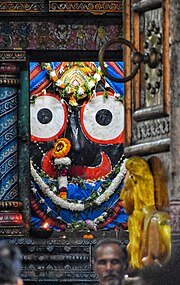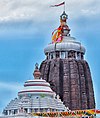| Odia script | ଦେବଗାନ୍ଧାରୀ |
|---|---|
| Melā | Debagandhari |
| Jati | Sampurna - Sampurna |
| Badi | Sadaja |
| Sambadi | Panchama |
Debagandhari (Odia: ଦେବଗାନ୍ଧାରୀ, romanized: debagāndhāri) is a rāga belonging to the tradition of Odissi music.[1][2][3] Falling under the meḷa of the same name,[4] the raga uses komala dhaibata and is traditionally associated with the karuṇa rasa.[5]
Structure
The raga is sampurna or heptatonic in its aroha and abaroha (ascent and descent). Its aroha-abaroha are given below :[6]
Aroha : S R G M P d N S
Abaroha : S N d P M G R S
The raga dwells or does nyasa on the panchama, as per tradition and evokes a pensive mood.[7]
| Oṛiśī Sangīta |
| Odissi music |
|---|
 |
| Composers |
| Shāstras |
| Compositions |
| Instruments |
Compositions
Some of the well-known traditional compositions in this raga include :
- Jaa Re Jaa, Brajaraja Nagare Tu Jaa by Lokanath Pattanayaka
- Pranabandhua Aja To Anauni Nua by Kabisurjya Baladeba Ratha
References
- ^ Panda, Pt. Gopal Chandra (2004). Odisi Raga Ratnabali ओडिसी राग रत्नावली (in Hindi). Bhubaneswar. OCLC 225908458.
{{cite book}}: CS1 maint: location missing publisher (link) - ^ Parhi, Dr. Kirtan Narayan (2017). The Classicality of Orissi Music. India: Maxcurious Publications Pvt. Ltd. p. 383. ISBN 9788193215128.
- ^ Hota, Dr. Damodar (2012). Udra Paddhatiya Sangita (in Odia). Vol. 2. Bhubaneswar: Swara-Ranga. pp. 18–19.
- ^ Odisi Raga Sarani. Bhubaneswar: Odissi Research Centre. 2004.
- ^ Misra, Purusottama (2009). Bose, Prof. Mandakranta (ed.). Sangitanarayana (A Seventeenth Century Text on Music and Dance from Orissa). Indira Gandhi National Centre for the Arts and Motilal Banarsidass Publishers Pvt. Ltd. ISBN 9788120832886.
- ^ Das, Ramhari (2004). Odissi Sangeetara Parampara O Prayoga ଓଡ଼ିଶୀ ସଙ୍ଗୀତର ପରମ୍ପରା ଓ ପ୍ରୟୋଗ [The tradition and method of Odissi music] (in Odia). Bhubaneswar, Odisha: Kaishikee Prakashani.
- ^ Panda, Dr. Gopal Chandra (1995). Sri Gita Gobinda Swara Lipi [Notated music of the Gita Govinda] (in Odia). Bhubaneswar: Smt. Bhagabati Panda.









